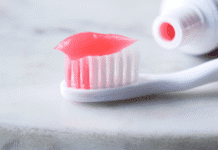Last Updated on January 18, 2026 by Rida Gul
Skin is the body’s largest organ and it’s important to take care of it, especially when you’re a baby. Babies’ skin is more delicate than adult skin so it needs special care. Here are a few simple tips to help keep your baby’s skin healthy and protected.
Table of Contents
1. Be mindful of dry skin
It’s important to be mindful of your baby’s skin, especially if they are prone to dry skin or eczema. In the first few weeks after coming home, it is normal for babies to develop small patches of dry skin. These patches will often go away on their own, without the need for any additional moisturizer.
However, if your baby has very dry or cracking skin, you can apply petroleum-jelly-based products. You can also apply a moisturizing lotion to the skin if it’s free of perfumes and dyes, which can irritate your baby’s skin even more.
Natural plant oils, such as olive, coconut, or sunflower seed oils, have been suggested as moisturizers for babies, but there’s some evidence that they may actually make dry skin or eczema worse in children. Therefore, it is always best to consult with your pediatrician before using any type of natural plant oil on your baby’s skin.
2. Follow best practices for bathing
Bath time is an important part of infant care, but it’s also one of the most potentially dangerous times for young babies. Every year, thousands of infants are injured or even killed in bath-related accidents. To help keep your baby safe, it’s important to follow some basic best practices.
First, always fill the tub with fresh, clean water before putting your baby in. And never leave your baby unattended in the tub, not even for a moment. Second, be sure to use gentle cleansers and avoid harsh soaps that can irritate your baby’s skin.
Finally, support your baby’s head and neck at all times to prevent injuries. By following these simple guidelines, you can help ensure a safe and enjoyable bath time for both you and your baby.
3. Keep your baby out of the sun
Keeping your baby out of the sun is important for several reasons. First of all, babies have very sensitive skin, and their skin can be easily sunburned. In addition, exposure to the sun can increase the risk of skin cancer later in life. Additionally, the sun can be dehydrating, and babies are especially vulnerable to dehydration.
Finally, babies are more likely to develop heat stroke when they are exposed to high temperatures. For all these reasons, it is important to keep your baby out of direct sunlight, especially during the midday hours when the sun is at its strongest. Instead, dress your baby in light-colored clothing and put them in the shade.
Be sure to apply sunscreen to any exposed skin, and make sure that your baby stays well-hydrated throughout the day. By following these simple tips, you can help keep your baby safe from the harmful effects of the sun. You may also take help from the best dermatologist in Lahore via Marham – Find a doctor around your place.
4. Don’t sweat cradle cap
While it may be tempting to try to scrub cradle cap away, it’s important to resist the urge. Cradle cap is not caused by dirt or poor hygiene, and scrubbing can actually irritate the skin and make the condition worse. Instead, try gently massaging your baby’s scalp with a soft brush or cloth.
This will help to loosen the scales and make them easier to remove. You can also apply a thin layer of coconut oil or other type of mild oil to the affected area. Leave it on for a few minutes before shampooing as usual. If cradle cap persists or you notice other changes in your baby’s skin, talk to your pediatrician.
5. Help prevent heat rash
As any parent knows, keeping a baby comfortable and safe is a top priority. One possible hazard during warm weather is heat rash. Heat rash occurs when the sweat glands become blocked and sweat is unable to evaporate from the skin. This can happen if a baby is overdressed or if clothes are too tight.
The rash usually appears as small red bumps, and it can be painful or itchy. In severe cases, the bumps may blister or become infected. To help prevent heat rash, keep an eye on your baby’s clothing. Make sure that they are not wearing too many layers, and that any clothing that does come into contact with the skin is loose-fitting and breathable.
In addition, try to keep your baby’s skin cool and dry, and avoid using lotions or potions that could further irritate the skin. By taking these precautions, you can help to ensure that your baby stays comfortable all summer long.
6. Care for the umbilical cord
When you first bring your baby home, the umbilical cord will still be attached at the belly button. You’ll need to keep the area as clean and dry as possible. The cord will usually fall off on its own within a week or two. In the meantime, you can help speed up the process by gently wiping the area with a clean, damp cloth.
If the cord stump starts to bleed, apply pressure with a clean gauze pad. Contact your doctor if the bleeding doesn’t stop or if the cord stump becomes red, swollen, or oozing pus. Once the cord falls off, you’ll be able to give your baby a bath. Until then, you can just sponge them off with a washcloth.
7. Watch for nail growth
It’s important to keep an eye on your baby’s nails, as they can grow quite quickly. Depending on how fast they grow, you may need to trim them every few days or so. Even though your baby’s nails are small and thin, they might still be sharp. If they’re left unchecked, they could scratch themselves or others.
You can use nail scissors or clippers to trim your baby’s nails. It’s important to be careful not to cut too deeply, as you could hurt your child. You can also file their nails with an emery board to smooth any sharp edges.
8. Avoid contact dermatitis triggers
Contact dermatitis is a very common skin condition that can occur in babies. It happens when something causes an allergic reaction on the skin, resulting in redness, itchiness, and even blistering. Common triggers include certain fabrics, soaps, detergents, and even food.
To help prevent contact dermatitis, it is important to avoid anything that you know or suspect may trigger an allergic reaction. If you are not sure what may be causing the reactions, you can speak to your baby’s doctor or a dermatologist for guidance.
In most cases, avoiding contact with the trigger will eventually clear up the rash. However, if the rash does not improve or if it begins to spread, you should seek medical attention as soon as possible.
Consult a Dermatologist
Keeping your baby’s skin healthy is important, and it can be a lot easier than you think. Just by following a few simple tips, you can help protect your child from the sun, moisturize their skin, and avoid common skin problems. If you have any questions or concerns about your baby’s skin health, be sure to consult a top skin specialist. Thanks for reading!
FAQ’s
What home remedy is good for baby skin?
Olive oil is a fantastic option for both rash treatment and post-rash skin renewal. Irritant dermatitis, diaper rashes, and allergy rashes can all be effectively treated by olive oil’s anti-inflammatory and antibacterial qualities. Coconut oil might moisturize and calm a rash. Coconut oil also aids in skin defense.
Read more: 4 Ways To Support Good Health Naturally
Do babies need lotion?
Products intended for adults could be excessively harsh or contain allergies or irritants for infants. Lotions are frequently used by parents. But lotions are not actually necessary unless the baby’s skin is really dry. Unless specifically advised by your baby’s doctor, powders should be avoided.
Read More: 4 Incredibly Useful Healthcare Apps.
if you want to know about 5 Tips To Ensure Your Baby’s Healthy then please visit our Health Category.
















